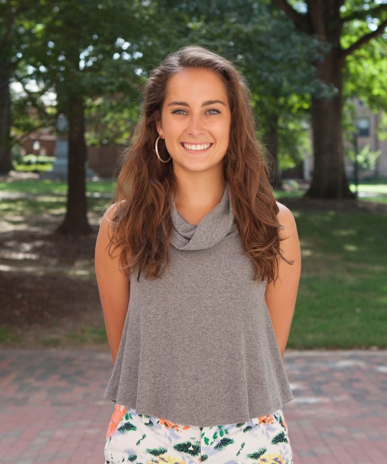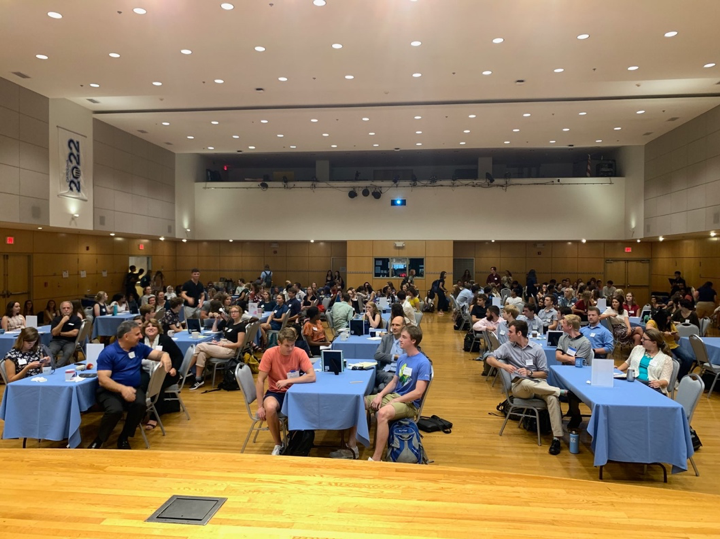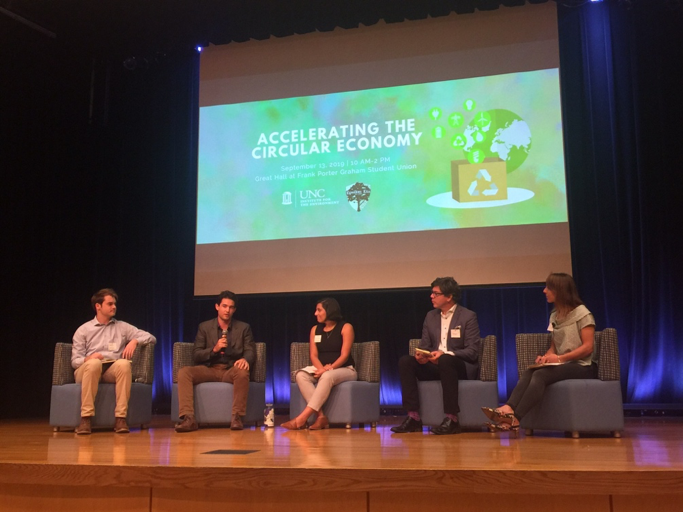Bailey McNeill is a senior Environmental Studies major and Public Policy minor at UNC-Chapel Hill, where she is also a member of Epsilon Eta Environmental Honors Fraternity.
Coming Full Circle
On the morning of Friday, September 13, The Great Hall in the Frank Porter Graham Student Union was abuzz with excitement as students gathered to learn more about the Circular Economy. The Institute for the Environment and Epsilon Eta Environmental Honors Fraternity co-hosted the event, “Accelerating the Circular Economy,” which garnered more than 400 registered attendees.
The line for the event extended out the door of the Great Hall, and the room was filled with students eager to learn more about the Circular Economy.
And what is the circular economy? In a circular economy, man-made systems are designed so that waste is not a part of the process. Instead of a linear “take, make, waste” model, commerce in the circular economy aims to leverage and recycle resources sustainably while turning a profit.
Allie Omens is the Ep Eta president and senior responsible for organizing the event, and as she stood on stage welcoming all of the attendees, I was struck by the capacity for changemaking that is available to us as UNC students, especially within student-led groups like Ep Eta. Omens secured Liza B. Schillo for the keynote address, and Schillo’s participation onstage was truly a full circle (pun intended). Schillo founded the first chapter of Ep Eta on UNC’s campus in 2006, and now, she is the Senior Manager for Global Product Sustainability at Levi Strauss & Co.
Schillo emphasized the importance of circularity beyond just physical product content, with a focus on system-wide change. The need for systemic and behavioral change was a common sentiment shared by many of the other panelists at the event.
Getting Down to Business
Schillo first moderated a panel focused on organics, featuring:
- Keirstan Kure, Procurement Specialist at Seal the Seasons
- Parker Reposa and Drew Enyedi, Co-Founders of Grounded Upcycling
- Sean Wilson, CEO at Fullsteam Brewery
Panel 1: Organics. From left to right: Drew Enyedi, Parker Reposa, Keirstan Kure, Sean Wilson, and Liza Schillo.
Amongst all the panelists, there was a theme of seeing opportunity in “waste” and capitalizing on it. For Grounded, a start-up that repurposes used coffee grounds into skincare products, the number one Key Performance Indicator they track is not profit, but how many pounds of coffee waste their business has diverted from landfill.
Following the organics panel, a delicious lunch was catered by the local public market Blue Dogwood. Inside the hall, there wasn’t a trashcan in sight, only receptacles for compost, recycling, and reusable dishes and mugs. I smiled when I spotted my mug that I had donated for the event amongst a sea of others. In small ways like this, the event put the concept of circularity into practice.
Following lunch, Schillo moderated a panel on materials, featuring:
- Charlie Schwarze, Director of Corporate Development at the Recycling Partnership
- Brandi Williams, Community Affairs Manager for City of Charlotte Solid Waste Services
- Karen Leonas, Professor at Wilson College of Textiles (NCSU)
- Emily Neville, Founder and CEO of Reborn Clothing Co.
I was excited to see Emily on stage, whom I had invited to speak at the event. I met Emily last summer when I interviewed her about Reborn for a blog I was writing. Reborn has grown a lot in their scope and scale in the past year, and they now partner with universities to transform surplus, branded material into new upcycled products, all while preserving the value in the brand. Emily is my age, and she started Reborn in college.
Accelerating Circular: Putting it into Practice
Seeing Emily on stage, I was again reminded of just how many resources we have available to us as university students here in the Triangle. The local companies and entities represented—Seal the Seasons, Fullsteam, Reborn, the Wilson College of Textiles, and Charlotte Solid Waste Services—highlight the fact that North Carolina is already a leader in the Circular Economy realm.
Benjamin Weir, the Business Development Manager for Terracycle’s Loop program, spoke to conclude the event. Loop packages common household products in reusable containers that can be picked up and re-used, eliminating disposal, single-use packaging and shipping materials.
The event showcased businesses and organizations from a diverse range of fields that are already accelerating the circular economy by putting these concepts into practice. I left the event invigorated and excited about the opportunities that exist when we cease to design systems with inherent waste, and instead, design systems with circularity in mind.
The issues highlighted at this event will continue to be a source of discussion at Carolina in coming months as the annual UNC Clean Tech Summit (February 20-21, 2020) will include the topic of the circular economy as one of its major themes.
More information about Epsilon Eta Environmental Honors Fraternity can be found here: https://www.epsilonetaunc.com/




